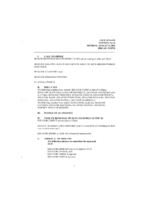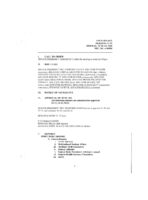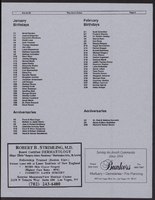Search the Special Collections and Archives Portal
Search Results

Transcript of interview with Midge Innis by James Thomas Griffin, May 8, 1976
Date
Archival Collection
Description
On May 8, 1976, James Thomas Griffin interviewed former casino dealer Midge Innis (born September 23rd, 1928 in Neligh, Nebraska) in her apartment in Las Vegas, Nevada about her life in Southern Nevada. The two discuss her occupational history as well as how she met her husband. The interview concludes Innis’ thoughts on environmental and social shifts in Las Vegas.
Text

Transcript of interviews with Louis Wiener, Jr. by Eleanor Johnson, January-February, 1990
Date
Archival Collection
Description
In this multi-part interview, Louis Wiener, Jr. discusses coming to Las Vegas from Pittsburgh at a young age, attending Las Vegas High School and University of Nevada Reno. He attended law school at University of California at Berkeley and passed the Nevada State Bar in 1941. He established a practice, Jones, Wiener and Jones, with Bob Jones and Cliff Jones and later with Herb Jones. He had another practice with Neil Galatz and Dave Goldwater, retiring in 1988. Wiener had other business ventures that allowed him to do pro bono work as a lawyer. Wiener discusses his family, including former spouses, his children, and various aspects of his career as an attorney in Las Vegas, representing hotels in the Greenspun antitrust lawsuit, and as an attorney for Bugsy Siegel. He says of his success, "I'm just lucky. I was here at the right time and I picked the right people to help."
Text

Magdalena Martinez oral history interview: transcript
Date
Archival Collection
Description
Oral history interview with Magdalena Martinez conducted by Monserrath Hernandez and Barbara Tabach on April 4, 2019 for the Latinx Voices of Southern Nevada Oral History Project. In this interview, Magdalena Martinez recalls her childhood and growing up in Los Angeles, California. Martinez's parents are from Durango, Mexico, and immigrated to the United States in the 1970s. Martinez describes the generational differences that the women in her family faced and how the feminist movement of the 1970s did not resonate with women of color. Her family moved to Las Vegas in 1986 where she attended Bishop Gorman High School. After transferring to the University of Nevada, Las Vegas (UNLV) from community college and joining a student organization that would later become Student Organization of Latinxs, she became an early member of the Latino Youth Leadership Conference (LYLC) sponsored by the Latin Chamber of Commerce. Martinez describes how the LYLC has evolved over the years, and talks about her role in those changes. She discusses past work for CSN, NSHE, and currently is the Director of Education Programs with the Lincy Institute.
Text

Meeting minutes for Consolidated Student Senate, University of Nevada, Las Vegas, August 09, 2004
Date
Archival Collection
Description
Text

Meeting minutes for Consolidated Student Senate, University of Nevada, Las Vegas, June 14, 2004
Date
Archival Collection
Description
Text

Transcript of interview with Lori Chenin-Frankl by Barbara Tabach, June 7, 2016
Date
Archival Collection
Description
Lori provides a wonderful narrative of her Judaism, her love of teaching children and her devotion to family and music. She talks about growing up in Las Vegas and becoming a bat mitzvah, a rarity for girls in 1973. Throughout her life, including the period where she moved around with her Air Force husband, she sought Jewish connections to help her feel at home no matter where she was.
Text

Transcript of interview with Judge Abbi Silver by Barbara Tabach, January 10, 2017
Date
Archival Collection
Description
It is evident that a keen wit and persistent tenaciousness to protect victims of crime have earned Judge Abbi Silver the reputation that elevated her to her current position as Chief Judge of the Nevada Court of Appeals. She is the first female to hold this position. Judge Silver is a lifelong resident of southern Nevada. She was raised in Boulder City, where her family was the only Jewish family at the time. Her father was a doctor and eventually the family moved into Las Vegas, where she graduated from Clark High School and then University of Nevada, Las Vegas (1986). Always an overachiever, she worked multiple jobs?waitress, Utah Jazz cheerleader, dancer?while earning her undergraduate degree and then her law degree from Southwestern University of Law, in Los Angles (1989). In this oral history, Judge Silver recalls being a law clerk for Honorable Earle White, Jr., joining the Clark County District Attorney?s Office and being assigned as the Chief Deputy DA for the Special Victims
Text

Steve Jones and Bart Jones interview, Novermber 7, 2016: transcript
Date
Archival Collection
Description
Brothers Steve and Bart Jones live and breathe Las Vegas history. Their grandparents, Burley and Arlie Jones, arrived in Las Vegas in the nineteen-teens; their father, Herb Jones; his sister, Florence Lee Jones Cahlan, and their uncle, Cliff Jones, helped form the legal, journalistic, and water policy framework that sustains Southern Nevada today. The Jones brothers build on that foundation through their custom home-building company, Merlin Construction. In this interview, they talk about living and growing up in Las Vegas, of attending John S. Park Elementary School, of hunting in the desert, of their family's commitment to cultural and racial diversity, and of accompanying their grandfather to his business at the Ranch Market in the Westside. They share their early work experiences lifeguarding and later, dealing, at local casinos as well as second-hand memories of the Kefauver trials through the tales told by their father and uncle. Steve describes mentor Audie Coker; he explains
Text

Transcript of interview with Patricia "Pat" Marchese and Lamar Marchese by Stefani Evans and Claytee White, February 7, 2017
Date
Archival Collection
Description
In this interview, the cultural power couple recall their early impressions of Las Vegas, their beloved Ninth Street house built by Marion Earl, and the changes that caused them to move when spot zoning destroyed their close-knit downtown neighborhood. Lamar speaks of the founding of public radio KNPR and KCNV, of finding studio space, of obtaining grant money to build on the campus of the (now) College of Southern Nevada, and of acquiring the Peter Shire sculpture that graces the front of the studio. He talks about the vision of Charles Hunsberger, of Hunsberger's fall, and of politically appointed boards of trustees. Pat shares her experience of meeting people in a babysitting co-op and the UNLV Art Department, getting her UNLV Master's degree in public administration, and her work in cultural programming with the City of Las Vegas and with Clark County. She speaks of creating gallery, classroom, and performing space at the City's Reed Whipple building and the Charleston Heights Art Center; of founding the Rainbow Company Youth Theatre; of developing Clark County's Desert Breeze Park, Flamingo Senior Center, and the Wetlands, among others; of placing exhibits of the Clark County Museum at McCarran International Airport; of the Public Arts Commission, the Airport Arts Commission, the Allied Arts Council, and of developing Community Development Block Grant programs for the City of Las Vegas and Clark County. Throughout the interview, Pat and Lamar Marchese exemplify why Southern Nevada got lucky in 1972. As the duo grew in their knowledge of and passion for the arts, they also honed their skills at bringing the arts to the public. And we, the Southern Nevada public, continue to benefit as their legacies live on through public radio, community arts programming, and useful and accessible parks.
Text

